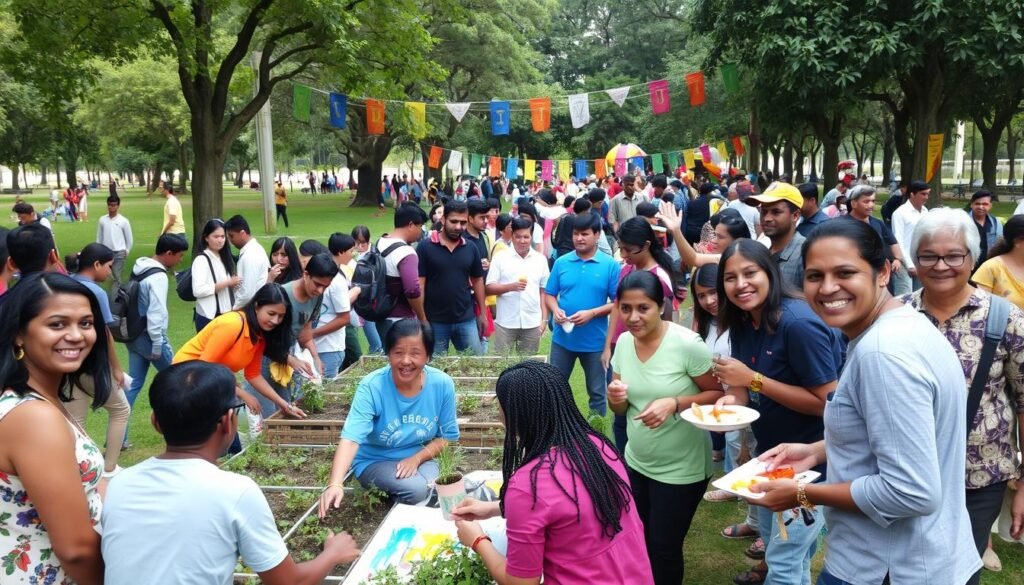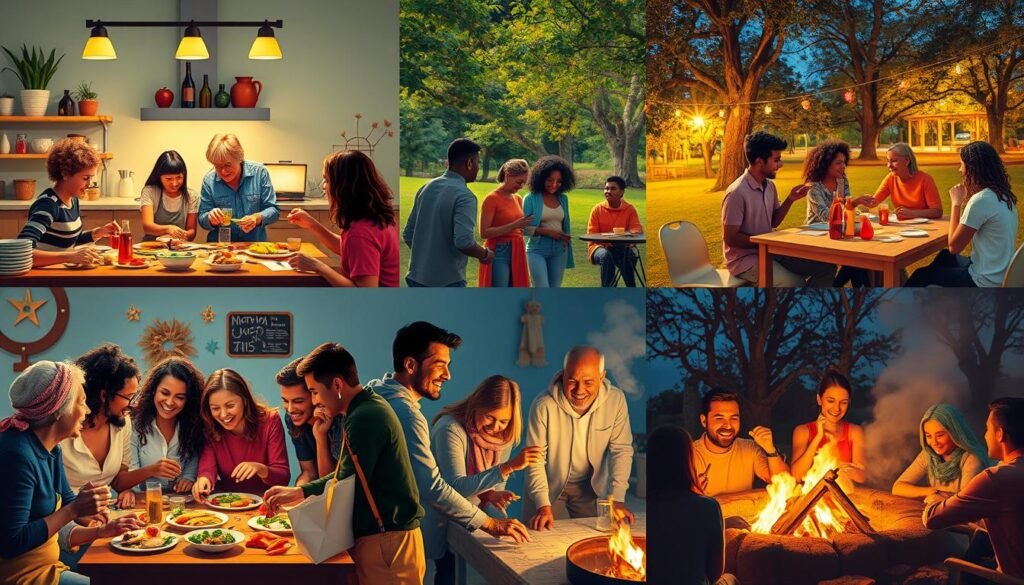Did you know group therapy helps people feel they belong? It involves 5 to 15 participants and tackles loneliness. This not only makes people less isolated but also boosts their mental well-being. Sharing stories within these groups strengthens connections and improves social skills significantly.
Psychological research backs the value of shared moments. They build a sense of community, making everyone feel more connected and uplifted. By sharing, people understand each other better and develop empathy. For example, sharing in the workplace boosts productivity and helps professional growth.
Key Takeaways
- Group therapy can foster social bonding and emotional connection.
- Sharing experiences reduces isolation and enhances community ties.
- Engaging in collective experiences promotes personal growth.
- Storytelling in group settings can develop empathy and compassion.
- Shared experiences improve mental well-being and resilience.
The Importance of Shared Experiences
Shared experiences are incredibly important. They help us feel like we belong and are connected to others. Taking part in activities with friends or family gives our life more meaning.
This is especially true in today’s world, where it’s easy to feel alone. Being with others helps us grow emotionally and stay well.
Even sharing moments with strangers can be valuable. A study in Psychological Science shows this. It found that shared experiences don’t just create memories. They build bonds that boost our mental and emotional health.
This, in turn, leads to greater understanding and caring among people. It also has good effects on our physical and mental abilities.
- Sharing activities can bring new ideas, especially with young people’s input.
- Talking about these shared moments can make us happier and more satisfied with life.
- It’s important to connect with others to fight the growing problem of loneliness.
Turning daily activities into shared moments can make our time together more rewarding. Events like holidays or team meetings provide chances to bond. They let us see different points of view.
This helps build a sense of community. It gives us the strength to support important causes and make a difference.
Benefits of Sharing Experiences
Sharing experiences greatly improves social bonds and emotional connections. When people share moments, they create lasting memories and strengthen their relationships. This sense of belonging and validation is crucial for our emotional health.
Enhancing Social Bonds
Sharing experiences boosts social bonds. Being part of group activities makes us feel more connected. Studies highlight that exchanging positive stories helps build stronger relationships and improves communication. For instance, shared experiences increase mutual understanding and empathy. This highlights the power of shared moments. People sharing life stories feel 81% closer to one another, showing the power of this practice.
Fostering Emotional Connections
Sharing experiences deepens emotional connections too. It helps people recognize and understand different emotions. Research shows that gifts of experiences stir more gratitude and emotional reactions than material gifts. This deepens emotional bonds. Taking part in shared moments enhances emotional intelligence and self-awareness. Sharing creates a meaningful legacy, uniting people beyond simple interactions.
| Benefit | Statistic |
|---|---|
| Enhanced Communication Skills | 67% increase in effective communication patterns |
| Improved Emotional Intelligence | 54% increase in emotional intelligence levels |
| Greater Self-Awareness | 43% rise in self-awareness of motivations |
| Increased Intimacy | 81% increase in feelings of intimacy |
| Better Understanding of Each Other | 63% enhancement in mutual understanding |
| Improved Mental Health | 46% improvement in mental health indicators |
| Sense of Legacy | 72% sense of legacy from sharing stories |
| Greater Appreciation for Life | 59% increase in appreciation for life |
Personal Growth Through Collective Experiences
Joining in collective experiences is key for personal growth. These shared activities help us see the world differently, making it easier to learn new skills. People from various walks of life come together, leading to unexpected self-discovery and better problem-solving abilities.
Take group therapy as an example. It shows how powerful being together can be. Those who join group therapy feel less alone and less judged about their mental health struggles. They learn new ways to cope by seeing others do the same. This sharing brings a strong sense of belonging and offers fresh insights.
In groups, everyone gets to work on important skills. Skills like talking clearly and understanding emotions better. Telling our stories helps us know ourselves better and makes us feel good about who we are. This doesn’t just help one person but brings everyone closer, making our communities stronger and more welcoming.
Together, we can add to our stories in a way that shines a light on important social issues. Collective experiences bring us together, helping each of us grow. They show us how important our communities are in shaping who we are. To learn more about why sharing experiences matters, check out this research.
| Impact of Collective Experiences | Individual Benefits | Community Outcomes |
|---|---|---|
| Reduction in Isolation | Enhanced Self-Awareness | Bridging Cultural Gaps |
| Diversified Perspectives | Boosted Self-Esteem | Fostering Inclusivity |
| Supportive Environment | Improved Communication Skills | Social Cohesion |
| Empathy Development | Enhanced Emotional Intelligence | Catalysts for Social Change |
Empathy Development in Group Settings
Group therapy is key for growing empathy. It lets people share and learn from their experiences. In these groups, individuals share stories, helping everyone understand and support each other.
Understanding Different Perspectives
In group sessions, hearing from others helps everyone see different views. This not only builds understanding but shows we’re not alone. Members find common ground in their feelings and stories, boosting empathy.
Cultivating Compassion
Sharing personal stories in therapy builds compassion. It’s crucial for growth and emotional health. Participants learn about each other’s lives, which helps create deep connections. This resource shows how group therapy sparks empathy. This makes a safe place for practicing empathy, leading to a caring community.

| Group Therapy Type | Description | Focus Area |
|---|---|---|
| Support Groups | Facilitated discussions among individuals facing similar challenges. | Shared experiences and emotional support. |
| Skills Development Groups | Focused on enhancing specific interpersonal skills. | Communication and conflict resolution. |
| Psychoeducational Groups | Groups that provide information and education on specific issues. | Knowledge sharing and skill-building. |
| Process-Oriented Groups | Exploration of interpersonal dynamics within the group. | Self-discovery and understanding others. |
| Therapeutic Groups | Guided sessions focused on emotional healing and growth. | Personal growth and resilience. |
Group therapy is a powerful way to meet challenges and grow empathy. It helps everyone learn and support each other.
Improving Mental Well-Being
Shared experiences are key to better mental health. When people unite to share their stories, a supportive community forms. Programs like batyr highlight this effect, especially for young folks facing mental health issues. These initiatives help lessen isolation. They also fight anxiety and depression by offering a safe place for sharing.
Reducing Feelings of Isolation
Feeling connected boosts emotional health. Joining programs like batyr can fight the sense of being alone. People realize others face similar challenges. They feel part of a community and build stronger social bonds. This belonging is vital for their mental health, improving self-acceptance and confidence.
Combatting Anxiety and Depression
Fighting anxiety and depression works best with effective methods, like sharing personal stories. Joining groups such as Honest, Open, Proud (HOP) arms people with mental health management tools. It reduces stigma and boosts social support by open sharing. These stories don’t just raise awareness; they empower people to seek help and grow.
| Program | Benefits | Impact on Isolation | Effect on Anxiety & Depression |
|---|---|---|---|
| batyr | Improved well-being, self-acceptance, confidence | Fosters community, reduces stigma | Encourages support-seeking behaviors |
| HOP | Reduces stigma-related stress | Enhances self-disclosure decisions | Provides coping strategies for mental illness |
Shared experiences greatly enhance mental health. They cut down on isolation and tackle anxiety and depression effectively. By promoting openness and support, communities enhance well-being for all.
Strengthening Relationships
Sharing experiences is key to stronger relationships. These moments build trust, making people feel safe with each other. When people tackle challenges together, their bond grows. This helps both individuals to grow personally.
Building Trust and Support
Trust is the backbone of any relationship. Committed relationships lower stress, studies reveal. Couples living together are often happier. Support is vital, especially during tough times like medical recoveries. This support strengthens the trust between partners.
Creating Meaningful Connections
Meaningful connections enhance health and longevity. Social ties can greatly increase one’s life span. People in healthy relationships tend to live healthier lives. They eat well and exercise regularly. Strong friendships also protect against mental health issues. Less depression and anxiety are seen in these individuals. Sharing life’s ups and downs makes these connections deeper and more meaningful.
Exploring New Perspectives
Exploring perspectives is key in growing our relationships. We learn a lot by sharing experiences, questioning our old views. With active listening and role-playing, we better understand others. This broadens our minds and helps us adapt.
Meeting new viewpoints can make conversations lively. At work or school, different ideas spark creativity and new ways to solve problems. This makes our discussions richer and our decisions smarter, benefiting everyone.
Social Emotional Learning (SEL) is vital for teaching kids and teens how to understand others. SEL uses open questions and reflection on experiences to help them grow. Building empathy-based trust is central for seeing different sides of a story.
To enrich discussions, overcoming our biases is a must. By holding off on judgments and staying open, we learn more. Seeking out various opinions helps us question our beliefs, leading to deeper understanding and better conversations.
| Skill | Description | Benefits |
|---|---|---|
| Active Listening | Fully concentrating and understanding the speaker’s message. | Improves communication and strengthens relationships. |
| Role-Playing | Acting out scenarios to understand various viewpoints. | Encourages empathy and broadens perspective. |
| Seeking Diverse Perspectives | Engaging with individuals from different backgrounds. | Fosters creativity and problem-solving. |
| Reflecting on Experiences | Considering past events and how they shaped views. | Facilitates growth and adaptability. |
Bringing different perspectives into our daily lives creates a welcoming space for real expression. By valuing open-mindedness, growth, and resilience, we enrich our experiences. This builds a creative and inclusive culture.
Positive Impact on Community
Shared experiences strengthen community bonds, making people feel connected and willing to work together. When people join forces for common goals, they can solve community problems more efficiently. This results in long-lasting social benefits. Many successful projects show that getting involved transforms communities for the better.
Encouraging Collaborative Efforts
Communities grow stronger when everyone takes part in joint efforts. Working together with the aim of improving the community leads to amazing achievements. For example, local volunteering doesn’t just meet current needs. It also helps volunteers feel mentally and physically better.

| Statistic | Impact |
|---|---|
| Volunteering increases self-confidence | Boosts self-esteem and life satisfaction |
| Regular volunteering reduces depression risk | Aids in combatting social isolation |
| Lower mortality rate among volunteers | Particularly beneficial for older adults |
| Weekly volunteers feel 16% happier | Happiness boost akin to significant income increase |
| Volunteering enhances career skills | Offers extensive training and real-world experience |
| Regular volunteers showcase better health | Promotes both physical and mental well-being |
| Sense of purpose from volunteer work | Contributes to overall life satisfaction |
By participating in these efforts, people not only improve their lives but also strengthen the community. This helps everyone feel more connected and work towards common goals. It shows that when we come together, we make our communities better places to live.
Sharing Experiences in the Workplace
In today’s workplace, sharing experiences is key. As much as 75% of employees find working together crucial. This teamwork boosts team dynamics, creating a collaborative environment ripe for innovation. For instance, tools like Slack, with over 20 messages sent daily, really help improve how we communicate and share.
Having more than 15 meetings weekly offers a chance to share new ideas. With over 1,000 emails a month, sifting through info is a big task. That’s why it’s important to have a space where sharing freely is encouraged. Leaders must build a culture that believes in teamwork. 67% of them say that culture matters more for success than strategy or operations.
Xerox’s Eureka Project shows how sharing can save big money, like $100 million. Toyota trains by pairing rookies with pros, which slashes costs and ups productivity.
An inclusive workplace also matters. A DNV survey noted that 88% think companies that welcome diversity do better than those that don’t. Programs boosting employee involvement can lift brand engagement by up to 40%, building a stronger work community.
Tools like GaggleAMP help spread a culture of sharing experiences. They can make teams stronger and improve workplace vibes. By focusing on working together, businesses can reach new heights.
Tips for Maximizing Shared Experiences
To get the most out of shared experiences, focus on two things. First, find people who think like you. Second, be open when you talk to them. These steps can make time spent together better and more memorable.
Finding Like-Minded Individuals
It’s important to meet people who like what you like. This makes everyone feel at home. Here’s how to find those groups:
- Join clubs that match your interests.
- Go to local events or classes you find interesting.
- Use social media to find groups with the same passions.
- Do volunteer work that means something to you. This helps meet others who care about the same things.
Embracing Open Communication
Talking openly is key for real connections. It builds trust and lets people share freely. To talk more openly, try these ideas:
- Listen well and show you understand what’s being said.
- Tell your stories. It helps everyone get to know each other better.
- Be open to new ideas. Everyone has something to add.
- Check in with your group often. This keeps everyone connected.
By following these suggestions, you can make great memories with others. Look for chances to meet, talk openly, and enjoy the time together.

Conclusion
Shared experiences deeply affect both people and communities. Facing challenges together can build strong connections. This also helps everyone grow and feel happier.
Research tells us that going through tough times together often makes bonds stronger. These shared moments give emotional support and a feeling of being part of something.
When teachers talk about different opinions, students learn to value diversity. This helps everyone work better together in a world with many cultures.
Seeking out shared experiences changes us for the better, both personally and as a group. It strengthens our connections and helps us understand each other more. This journey makes our daily interactions more meaningful.
For more on how sharing experiences online can improve health management and sleep’s role in mental health, check out this study and Insomnia Co.